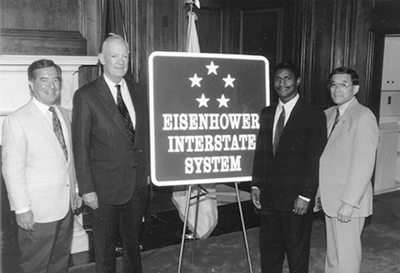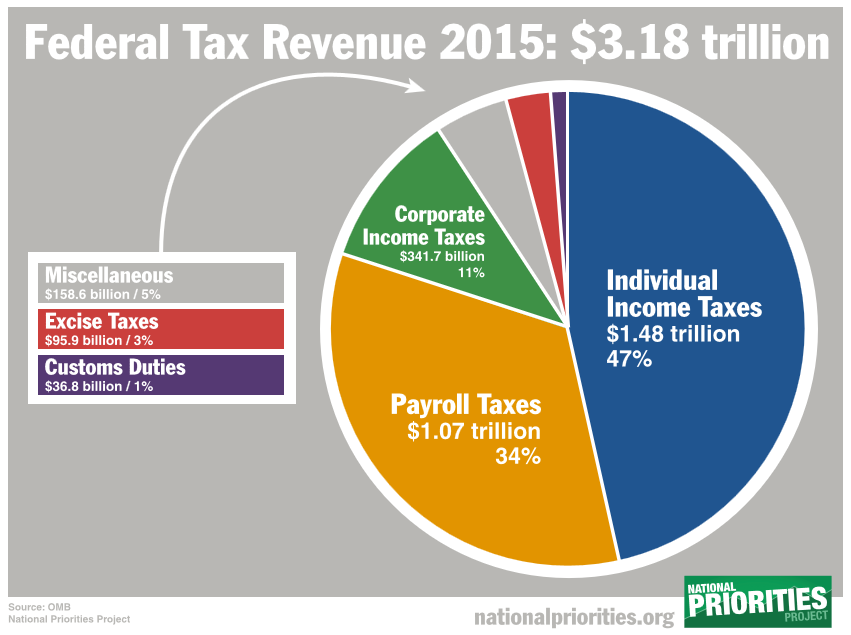The National Debt stands at just under $19.3 trillion Dollars, (as of June 2016), and has risen every year since 1957. Budget deficits are a certainty under our present system of governance (if we can give it such a lofty title), a situation unlikely to change.
Income and Expenditure
Deficits occur because of a mismatch between revenues and spending. America’s principal source of revenues at the Federal level are income taxes from people and corporations and modest amounts of customs and excise taxes from trade. Federal spending includes mandatory outlays (65%), discretionary (29%) and interest on the Federal Debt (6%). Mandatory spending includes Social Security and Unemployment Benefits while Discretionary spending is dominated by military costs (over 50%).
Obviously, we are spending more than we earn (an unacceptable situation in any orderly household) and yet, for 59 years we have been unable to elect a Government that can commit to controlling its financial habits. In addition, political ideology fosters a yawning gap between the objectives of our two main parties: no new taxes (Republicans); higher minimum wage, more entitlement spending (Democrats), among other things.
Need for a new solution, or rethinking the old?
So what could be done to solve this seemingly intractable problem? The notion of lower taxes promoted by Republicans is attractive to both individuals and corporate entities, but without matching cuts in expenditure can only worsen an already dire situation. Similarly, the idea that our unskilled labor force deserves a wage they can live on and that Government steps in to support the least fortunate of our society makes powerful, moral sense, but is only sustainable if we raise enough funds to pay for these programs. Obviously our political representatives, handcuffed by the own party ideologies and promises made to secure election funding need a new way of thinking to break out of this absurd mess.
Job one? Jobs!
 Initially, they should cast off some of the old-fashioned statistics that mask the real story behind America’s problems. Tax revenues come from income and yet, incomes for the majority of Americans have been stagnant or have fallen for the last couple of decades. As well as being disgraceful for an economy of this size and strength, it is a mystery given our stated unemployment rate of around 5%, a level at which there should be some upside pressure on incomes. But it is apparent that the “actual” unemployed rate, of over 15 million people, is close to double the official measure, when under-employment and people who have given up looking are taken into account.
Initially, they should cast off some of the old-fashioned statistics that mask the real story behind America’s problems. Tax revenues come from income and yet, incomes for the majority of Americans have been stagnant or have fallen for the last couple of decades. As well as being disgraceful for an economy of this size and strength, it is a mystery given our stated unemployment rate of around 5%, a level at which there should be some upside pressure on incomes. But it is apparent that the “actual” unemployed rate, of over 15 million people, is close to double the official measure, when under-employment and people who have given up looking are taken into account.
And why is our economy, which while hardly booming, has been trucking along at 2%+ growth since the end of the Great Recession (Q4 2009), not creating enough jobs? Because of immense pressure put on companies to cut costs, the explosion of new technologies that maintain productivity with fewer workers and the lack of a corresponding plan to create millions of new jobs to compensate.
A combination of ideologies
Once Washington has an accurate picture of the real job situation in America, perhaps they could start to take real action. They might actually like the result! People need jobs; people with jobs pay income taxes and spend in the economy. You do not need to believe in trickle-down economics to understand this basic relationship. At the same time, more real employment leads to less pressure on social services as people are more able to look after themselves.
So far, this is pretty close to Republican orthodoxy but let’s not leave out the Democrats by ignoring the role Government must play in this situation.
When we look at the ability of entities to create jobs, placing the burden on small business, the little-engine-that-could of the political world, is unfair, impractical and unworkable. Small businesses, even with a tax regime that shelters more of their earnings, would be hard-pressed to employ millions of workers, especially long-term.
Government has the answer?
What is needed are large-scale jobs programs, that take thousands, and eventually millions of workers out of the unemployment lines into work that is meaningful for them, both in pay and a feeling of usefulness, and meaningful for the country, in its contribution to economic growth via taxes and personal spending. As a side note, this is the one element about the minimum wage debate I find most perplexing. It is always looked at solely from the perspective of the employer. What is ignored by the anti-minimum-wage-hike brigade is how every cent of a minimum wage worker’s pay packet is recycled into the economy. How can that be bad for America? True, profits may decline at the employer (although higher wages often breed greater effort and less staff turnover, both positive for business) but if the boss can only stay in business by paying employees poverty level wages, maybe he needs to rethink his business model.
Back on task, if a large public company were to consider a major new business venture that would employ tens of thousands of workers, the first focus of all interested parties would be: how much is it going to cost? The infrastructure around major new plants, factories, refineries, sales networks, etc. is massive and costs billions. While a commitment from shareholders and local government would be difficult to negotiate for an existing business, imagine how much resistance there would be for a totally new greenfield venture! For the scale that is needed to make a serious dent in the unemployment rolls and therefore help put this country’s financials back on track, I cannot imagine a company on the planet that would commit to the size and scale of investment required.
That leaves Government. With access to the cheapest funding, in large amounts; an ability to amortize investment over decades; no shareholders clamoring for dividends or share buybacks; the clout to negotiate major deals; all backed by law-making capabilities that could promote the enterprise in keeping with of US interests.
Tough choices when the chips are down
America has a history of similar deals, enacted when the going was tough and the need was great. And Americans understand, instinctively the concept of national need and hard choices. War bonds in World War Two were an obligation that paid for a massive mobilization and helped win the war. Eisenhower’s Interstate Highway System was a massive jobs program that put thousands to work which started in the 1950’s and benefited a huge swathe of America. The need was great during those times: arguably we could use something similar today. Besides providing jobs to the countless unemployed, the creation of infrastructural projects has many other benefits.

This commemorative sign was introduced in 1993. The five stars commemorate his rank as General of the Army during World War II.
Political Dysfunction
To remain in a corner, captive to a political ideology that only offers one prescription for the nation’s ills is absurd, and both major parties practice this foolishness. If the situation weren’t so dire, there would be no need for a major rethink about party objectives. But the mere fact that Donald Trump and Bernie Sanders have had such an impact (regardless of the result) on Presidential politics in 2016 demonstrates just how angry, frustrated and hopeless a lot of people in America are right now.
True service to this country is best represented by bold ideas (that challenge current orthodoxy), the power of persuasion (of colleagues in the political system on both sides of the aisle) and a selfless commitment to getting things done (instead of just working toward reelection).
Some Votes Are Worth More Than Others
One of the greatest absurdities of our situation here in America is that we, the people, accept the status quo. We accept that our elected representatives enjoy steady pay and benefits, spend substantial amounts of time campaigning for reelection, adhere to dogmatic philosophies and spend time pontificating in the media while achieving next to nothing in terms of governing and refusing to ever, ever compromise. However, the public’s perception of Government is changing and more than ever reflects a general disgust at our current model. Recent Supreme Court decisions have made it abundantly clear that there is more than morals, ethics and the meaning of the Constitution being discussed behind closed doors. While money has always been a huge influence in American politics, the Citizens United vs. Federal Election Commission decision handed down in 2010, formalized the corrupt nature of American politics by allowing unlimited donations to flow from the pockets of people, organizations, unions and more. In confirming the irrelevance of one person’s vote, it’s hardly surprising that we see pitchforks at the gates.
American voters have an opportunity every two or four years to make their voices heard. November 2016 will provide strong evidence as to whether the Trump/Sanders phenomenon is a flash in the pan, and whether Americans care enough about their country to vote for real change.
No Fields Found.
